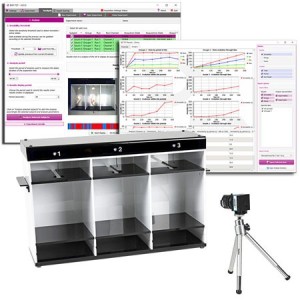Authors
DW Lim, J Park, D Han, et al
Lab
Division of Food Biotechnology, University of Science & Technology, Daejeon, Korea
Journal
Nutrients
Abstract
Neuroinflammation is associated with an increased risk of depression. Lipopolysaccharide (LPS) treatment is known to induce pro-inflammatory cytokine secretion and a depressive-like phenotype in mice. Although Erythronium japonicum exhibits various health benefits, the role of E. japonicum extract (EJE) in inflammation-associated depression is unknown. This study aimed to explore the anti-inflammatory effect of EJE on LPS-induced depressive symptoms in mice using the open field test (OFT), passive avoidance test (PAT), tail suspension test (TST), and forced swim test (FST). LPS-treated mice had significantly increased immobility time in the TST and FST, decreased step-through latency time in the PAT, and decreased locomotor activity in the OFT. However, administration of 100 and 300 mg/kg of EJE significantly improved these depressive-like behaviors. EJE also prevented the increase in mRNA levels of tumor necrosis factor-alpha (TNF-alpha), interleukin-1beta (IL-1beta), IL-6, and monocyte chemoattractant protein-1 (MCP-1), and the decrease in IL-10 levels by inhibiting nuclear factor-kappaB (NF-kappaB) subunit p65 phosphorylation. Additionally, LPS-treated mice showed markedly decreased brain-derived neurotrophic factor (BDNF) levels and phosphorylation of phosphoinositide 3-kinase (PIK) and Akt, while EJE treatment significantly increased these levels in the hippocampus. These results suggest that EJE ameliorated LPS-induced depressive-like behavior by reducing LPS-induced neuroinflammation and activating the BDNF-PI3K/Akt pathway
BIOSEB Instruments Used
Tail Suspension Test - Wireless (BIO-TST5)
Source :

 Pain - Thermal Allodynia / Hyperalgesia
Pain - Thermal Allodynia / Hyperalgesia Pain - Spontaneous Pain - Postural Deficit
Pain - Spontaneous Pain - Postural Deficit Pain - Mechanical Allodynia / Hyperalgesia
Pain - Mechanical Allodynia / Hyperalgesia Learning/Memory - Attention - Addiction
Learning/Memory - Attention - Addiction Physiology & Respiratory Research
Physiology & Respiratory Research











![Dynamic Weight Bearing 2.0 – Postural Module [Add-on]](https://bioseb.com/733-home_default/dynamic-weight-bearing-20-add-on-postural-module.jpg)
























 Pain
Pain Central Nervous System (CNS)
Central Nervous System (CNS) Neurodegeneration
Neurodegeneration Sensory system
Sensory system Motor control
Motor control Mood Disorders
Mood Disorders Other disorders
Other disorders Muscular system
Muscular system Joints
Joints Metabolism
Metabolism Cross-disciplinary subjects
Cross-disciplinary subjects CONFERENCES & MEETINGS
CONFERENCES & MEETINGS 